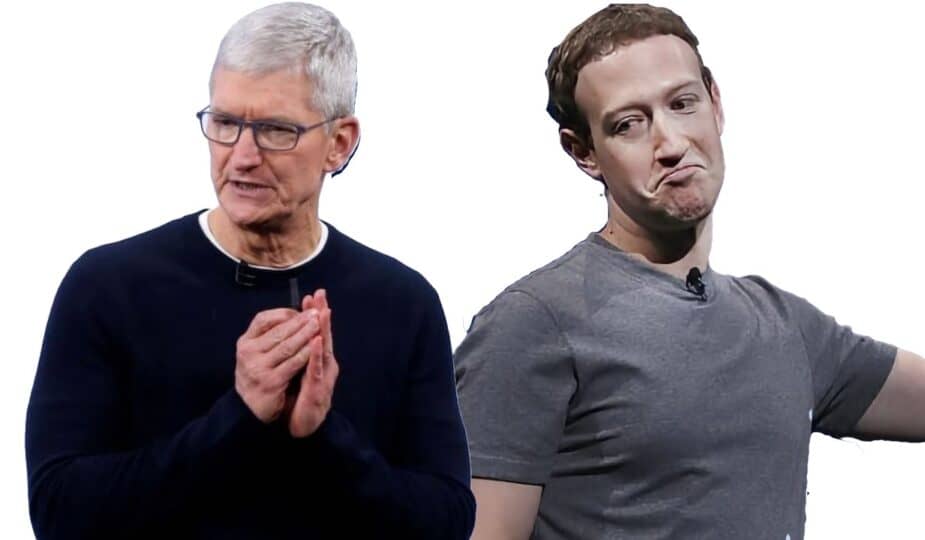Left: Apple CEO Tim Cook. Right: Meta CEO Mark Zuckerberg – images courtesy of Apple and Meta
 4 Facebook x.com Reddit
4 Facebook x.com Reddit
While Apple accuses Meta of trying to use EU laws to abuse privacy, Meta argues that Apple is worse. It's just the latest chapter in a long battle between the tech giants.
The latest spat between Apple and Facebook owner Meta… is pretty much like all the previous exchanges. Apple is accusing Meta of privacy violations, and Meta isn't exactly denying it, but it's doing a good job of deflecting attention.
This time, Apple questions the EU mandate to cooperate with rival firms, pointing out that Meta has been trying it on lately. Meta responds by commenting that Apple would say that, wouldn't they?
Yes, they would. Apple's stance on privacy could be that the company believes in basic human rights, as it claims, or it could be a solid marketing strategy that differentiates the firm from its competitors.
But Meta's stance on privacy is neither. Meta appears to view privacy as a revenue stream, and for once, you can actually appreciate that.
It's all very well that Apple and others say that if a product is free, then you really are the product. It's all very well that privacy advocates say that firms like Meta are making money off of us.
But when you look at how much money is being squeezed out of the machine, it becomes real. In 2021, Apple rolled out App Tracking Transparency, which forces users to opt in or out of allowing an app to track their usage to report it to advertisers.
Enough Apple users clicked the new “Ask an app not to track” button that Meta was forced to tell its shareholders that its revenue for the year would drop by $10 billion.
Ten billion. Meta was making ten billion dollars off of us and we didn’t even know it.
You could argue that we should have known, not least because Meta has gotten into trouble many, many times over our privacy. For example, when it struck a deal with the controversial Cambridge Analytica, which gave it access to significant data on 87 million Facebook users.
Meta ended up paying $725 million to settle a class action lawsuit over the issue, on top of the $5 billion the FCC fined it for the same issue.
Tim Cook Weighs In
Apple sometimes seems reluctant to comment on other firms’ stances on privacy, but CEO Tim Cook responded forcefully when asked about Meta and Cambridge Analytica. He was specifically asked what he would do if Meta CEO Mark Zuckerberg were running the company, and he said he couldn’t answer for the simple reason that if he were running Meta, the firm “wouldn’t be in this situation.”
“I think the best regulation is no regulation, it's self-regulation,” Cook continued. “But I think we've gone beyond that.”
Zuckerberg didn’t take that lying down. “You know, I think this argument that if you don’t pay us, we can’t care about you is incredibly shallow,” he said, “and it’s not true at all.”
“But if you want to build a service that’s not just for rich people, then you need something that people can afford,” Zuckerberg continued. “[At] Facebook, we’re definitely in the camp of companies that are working hard to charge you less and provide a free service that everyone can use.”
This wasn’t some short-lived spat between CEOs; it’s a fundamental and ongoing difference between the two firms and how they choose to make money. And three years after Zuckerberg claimed he only exists on advertising to help people, Cook is back at him.
Speaking at the 2021 European Conference on Computers, Privacy and Data Protection, Tim Cook didn’t name Meta, but there was no doubt who he was talking about.
Subscribe to AppleInsider on YouTubeSubscribe to AppleInsider on YouTube
“Technology doesn’t need massive amounts of personal data stitched across dozens of websites and apps to succeed,” he said. “Advertising has existed and thrived for decades without it.”
“If a business is built on misleading users, on exploiting data, on choices that aren’t really choices at all, then it doesn’t deserve our praise, it deserves reform,” he continued. “At a time of rampant misinformation and algorithm-fueled conspiracy theories, we can no longer turn a blind eye to the theory of technology that any interaction is a good interaction, the longer the better, all in the name of collecting as much data as possible.”
“Too many people are still asking, ‘How much can we get away with?’” Cook said, “when they should be asking, ‘What are the consequences?’”
Apple and Meta's Strengthened Positions Today
If nothing else, Apple has made privacy a talking point. Whether you're cynical about its reasons or not, you can rest assured that it keeps your data private, because failure to do so would be disastrous for Apple.
Being caught selling data to third parties while claiming you don’t would be damaging to any firm, and the potential fines would be damaging to most. But while Apple could at least theoretically pay any fine, look at the attention it gets even when it’s falsely accused of privacy violations.
Criticism of Apple is clickbait, and it creates a furor around everything – but for Meta, these privacy issues don’t always even make the news. There were few headlines this week, for example, when Meta had to pay $32 million to settle a case with Australia’s privacy watchdog.
Or the $263 million it paid – also this week – to settle another privacy case with Ireland’s Data Protection Commission.
What happens next
Meta will continue to accuse Apple of being a red herring. Like how it has repeatedly criticized the firm for charging developers a 30% cut of the App Store — so you don't notice it charges them 50%.
Apple will continue to tout privacy as a core part of its business, and that will at least lead to more advertising, if not more tech developments.
Ultimately, there's the Jerry Maguire solution. If users insist that Apple and Meta “show me the money,” then you get Facebook eventually admitting to storing and using massive amounts of data about you.
While Apple doesn't make money selling its users' data. You can easily point out that it doesn't need to, it makes enough money off of us with its hardware and services.
But whether altruistic or marketing-savvy, Apple is on the side of privacy, and there's no way Meta could say the same with a straight face.
Follow AppleInsider on Google News










